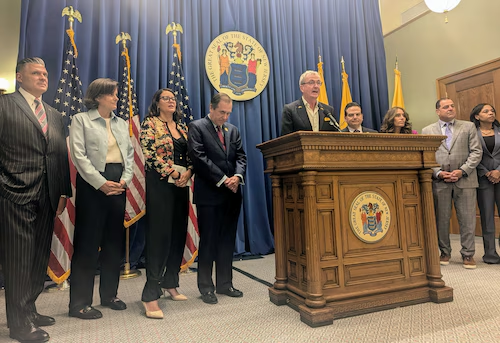New Jersey Governor Phil Murphy signed a $56.6 billion budget raising taxes on big corporations to fund transit and education, while critics argue it may harm economic growth.
Controversy Surrounds New Jersey Budget as Taxes Rise Amidst Education and Pension Investments
According to ABC 7, New Jersey Governor Phil Murphy signed a $56.6 billion budget just before midnight on Friday, raising taxes on big corporations to support the state’s transit agency and spending billions on education and other programs. The Democrat-led Legislature passed the budget just hours before, and Phil Murphy signed it two days before the deadline, avoiding a government shutdown. Phil Murphy said the budget will make life more affordable for families, create new economic opportunities, and invest in the community, including a lot of funding for K-12 education, property tax relief, and public pensions.
The new budget raises taxes for businesses making over $10 million a year, increasing the top corporate rate from 9% to 11.5%. This tax increase called the corporate transit fee, is meant to help fund New Jersey Transit, which has been using capital funds for its operational budget. While the tax increase is a step towards dedicated funding for the transit agency, more support will be needed in future budgets. The budget also increases state funding for K-12 education by nearly $1 billion to fully meet the aid formula set by the state Supreme Court.
READ ALSO: Biden Vs. Trump Debate Highlights Policy Rifts Over Aging Concerns

$56.6 Billion Budget Breakthrough: New Jersey Governor Phil Murphy Signs Historic Package with Tax Hikes and Education Boost (PHOTO: Fox 29)
New Jersey Governor Phil Murphy Signs $56.6 Billion Budget with Increased Taxes on Corporations for Transit and Education Investments
Despite these efforts, Republicans and business groups are unhappy with the higher taxes, saying they will hurt economic growth and unfairly target responsible companies. Still, Phil Murphy‘s administration has made big changes to the state’s finances since he took office in 2018, putting more money into education, public pensions, and the state’s savings fund, while also bringing back taxes on high-income earners and large corporations.
READ ALSO: 233,000 Weekly Jobless Claims Dip As Unemployment Benefits Rise To 1.84 Million

















































